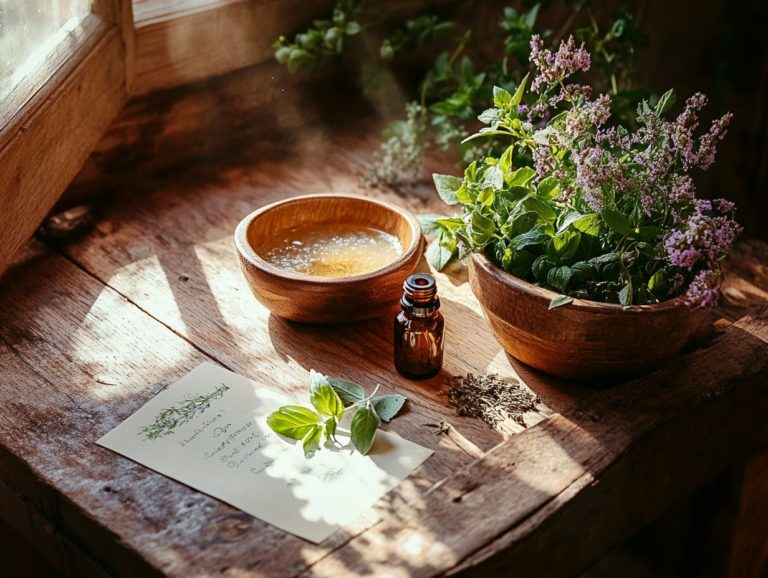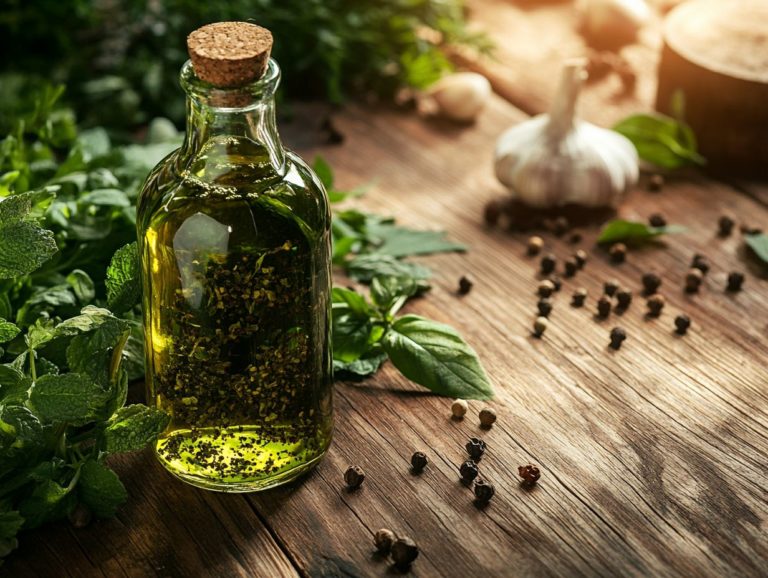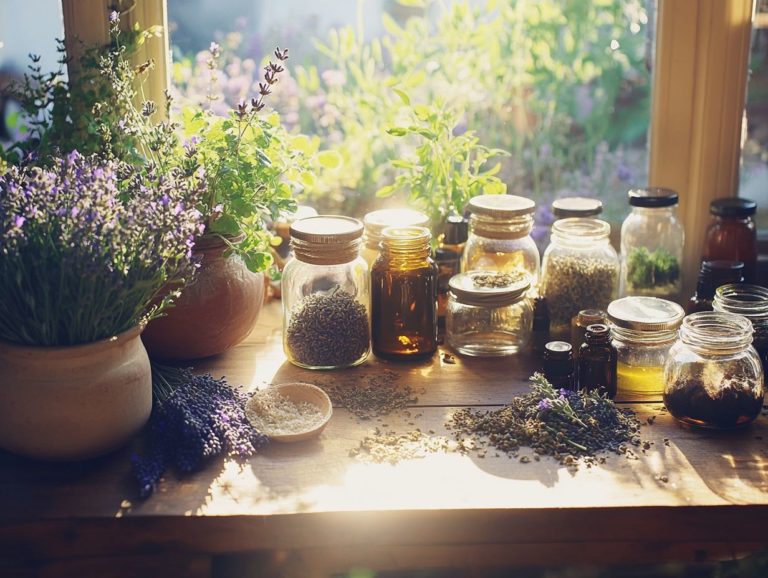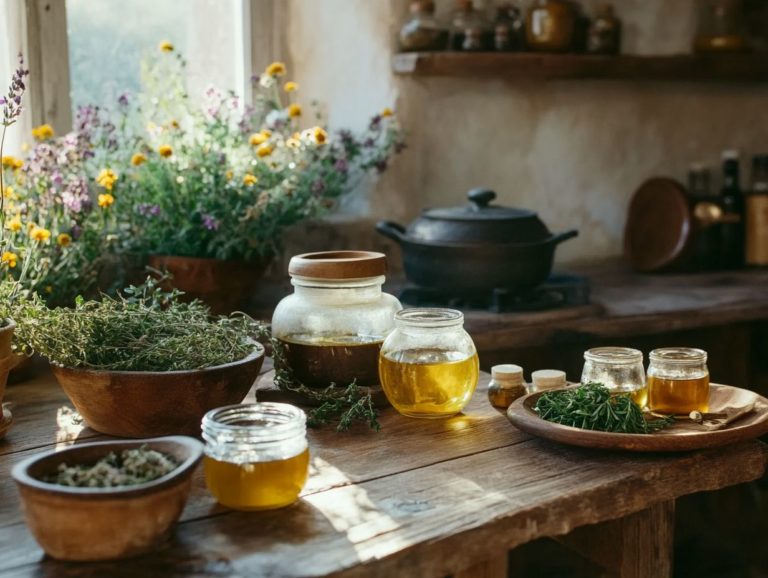Herbal Remedies for Cold and Cough: DIY Tips
Colds and coughs are those pesky ailments that can disrupt your daily life, often leaving you in search of relief. Understanding the causes and symptoms of these respiratory issues is key to recognizing how herbal remedies can offer effective, natural treatment.
This guide will illuminate the benefits of herbal treatments, complete with simple DIY recipes to help you combat these unwelcome illnesses. It also shares essential precautions and tips for seamlessly integrating these remedies into your routine, all aimed at bolstering your immune system and promoting hydration.
Join us and unlock the incredible power of nature for your health!
Contents
- Key Takeaways:
- Understanding Colds and Coughs
- Benefits of Herbal Remedies
- DIY Herbal Remedies for Colds and Coughs
- Precautions and Considerations
- How to Incorporate Herbal Remedies into Your Daily Routine
- Frequently Asked Questions
- What are some commonly used herbal remedies for cold and cough?
- How does ginger help with cold and cough?
- Can garlic be used as a natural remedy for cold and cough?
- Is honey safe to use for cold and cough?
- What is elderberry and how does it help with cold and cough?
- Can Echinacea help to prevent and treat cold and cough?
Key Takeaways:

- Boost your immune system with natural herbal remedies to fight colds and coughs.
- Consult a healthcare professional before trying DIY herbal remedies to avoid interactions with medications.
- Incorporate herbal remedies into your daily routine to stay healthy and prevent future illnesses.
Understanding Colds and Coughs
Understanding colds and coughs is paramount for managing your symptoms with precision. These prevalent illnesses can strike anyone, resulting in discomfort and, at times, more serious complications.
While both colds and flu stem from viruses, they present distinctly in terms of severity and symptoms. A cold generally has a milder impact, often manifesting as nasal congestion, a cough, and occasional sore throat, sometimes accompanied by a slight fever.
In contrast, the flu can hit you hard, often accompanied by a high fever and a more aggressive assault on your immune system.
Recognizing the specific symptoms is crucial for effective treatment, allowing you to navigate these ailments with confidence and ensure you get enough rest.
Causes and Symptoms
Colds and flu are primarily the result of viral infections that can compromise your immune system, leading to a range of uncomfortable symptoms, including mucus buildup. Colds are often caused by rhinoviruses, while influenza viruses are responsible for the flu, each posing unique challenges to your body.
You may experience common symptoms like nasal congestion and increased mucus production, often accompanied by a cough and fever especially in the case of the flu, which typically requires additional treatment for relief.
These symptoms manifest as your body mounts its defense against the invading viruses. While colds generally result in milder discomfort, flu symptoms can be much more pronounced, often featuring high fever, body aches, and debilitating fatigue.
Your immune system responds to these threats by releasing specific proteins and antibodies, which can lead to inflammation and the noticeable discomfort you feel. You might encounter varying degrees of sinus pressure and headaches, illustrating how these respiratory illnesses can disrupt your overall well-being in different ways.
Benefits of Herbal Remedies
Herbal remedies present a natural alternative for managing colds and coughs, enhancing your immune system while effectively alleviating bothersome symptoms, such as sore throats and nasal congestion. Ingredients like ginger, garlic, and elderberry have long been celebrated for their remarkable health benefits, boasting both anti-inflammatory and antiviral properties, which help fight off viruses that cause illness.
By integrating these herbal solutions into your routine, you not only support your recovery but also strengthen your body s defenses against infections. When paired with supplements like vitamin C and probiotics, you can elevate your overall well-being to new heights.
Remember to consult with a healthcare professional when trying new remedies to ensure they are right for you.
Natural Healing Properties
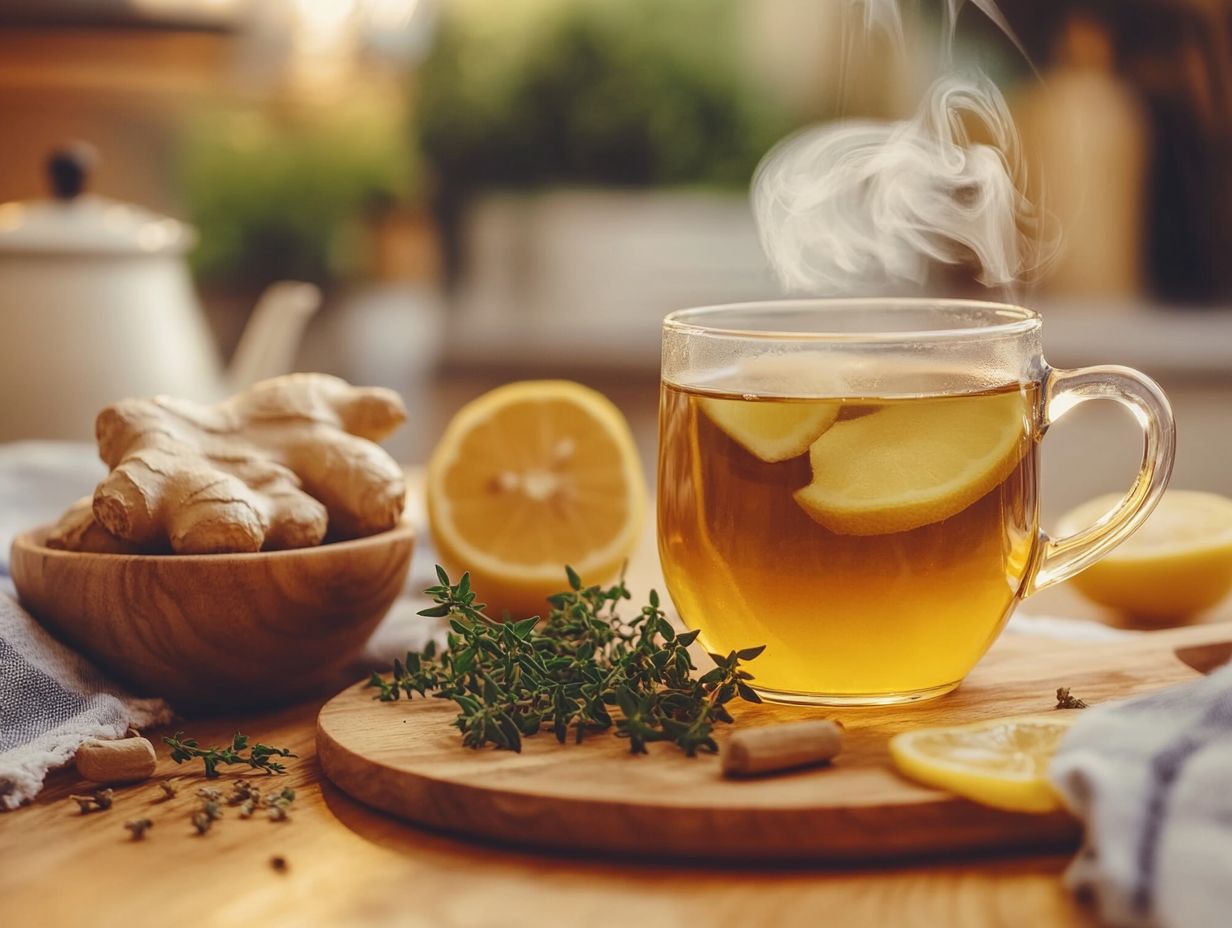
Natural healing properties found in various herbs and foods, such as eucalyptus and peppermint, can significantly bolster your immune system and support recovery from colds and coughs.
By incorporating these ingredients into your daily routine, you can harness their natural goodness to enhance your well-being. Honey, renowned for its antimicrobial properties, not only soothes irritation in your throat but also helps combat infections with its rich antioxidants.
Ginger, with its anti-inflammatory benefits, can ease respiratory discomfort and promote faster healing. Garlic, often hailed as a natural antibiotic, bolsters your immune response, helping your body fend off viral invaders.
The comforting warmth of herbal teas made with elderberry and ginger offers a relaxing experience that calms sore throats while supporting recovery. These teas are an ideal ally during flu season.
These natural remedies present a gentle yet effective approach to alleviating cold and flu symptoms, and you can even try making DIY herbal cough drops to pave the way for quicker recovery.
DIY Herbal Remedies for Colds and Coughs
Creating your own herbal remedies for colds and coughs offers a simple yet highly effective way to expand your treatment options. By utilizing everyday ingredients like honey, ginger, and garlic, you can craft soothing mixtures that not only alleviate symptoms but also encourage healing.
Take ginger tea, for example it can warm your body and ease nasal congestion. A saltwater gargle can provide relief for a sore throat and help reduce inflammation.
This approach not only enables you but also brings a touch of nature’s goodness into your wellness routine.
Recipes and Step-by-Step Guide
Crafting effective herbal remedies at home opens up a world of recipes designed to address various symptoms related to colds and coughs. You might opt for soothing ginger tea, a delightful honey-infused herbal concoction, or even a saltwater gargle each one plays a vital role in easing discomfort and providing hydration.
For instance, blending ginger with honey creates a powerful remedy that calms coughing and boosts hydration.
You can also add ingredients like garlic and thyme for added benefits. These ingredients help clear stuffy noses, while lemon adds a refreshing burst of vitamin C, ensuring your treatment is both effective and flavorful.
A simple broth made from fresh garlic cloves can fortify your immune system, providing warmth and comfort.
Meanwhile, steeping thyme in hot water for about ten minutes can work wonders for throat irritation, thanks to its antiseptic qualities.
By experimenting with these natural ingredients, you can personalize your remedies to meet your specific needs, embracing a nurturing, holistic approach to health.
Precautions and Considerations
While herbal remedies can offer considerable benefits for treating colds and coughs, it s essential to exercise caution and consult a healthcare professional before embarking on any new treatment regimen.
Certain herbal ingredients may interact with your medications or worsen pre-existing health conditions. It is critical to prioritize safety and effectiveness.
By understanding how these remedies function within the larger framework of your immune system, you can navigate potential risks with confidence.
Try these remedies today to feel better fast!
Don t wait; your natural healing journey starts now! We encourage you to share your experiences or try the recipes mentioned above.
Consulting with a Healthcare Professional
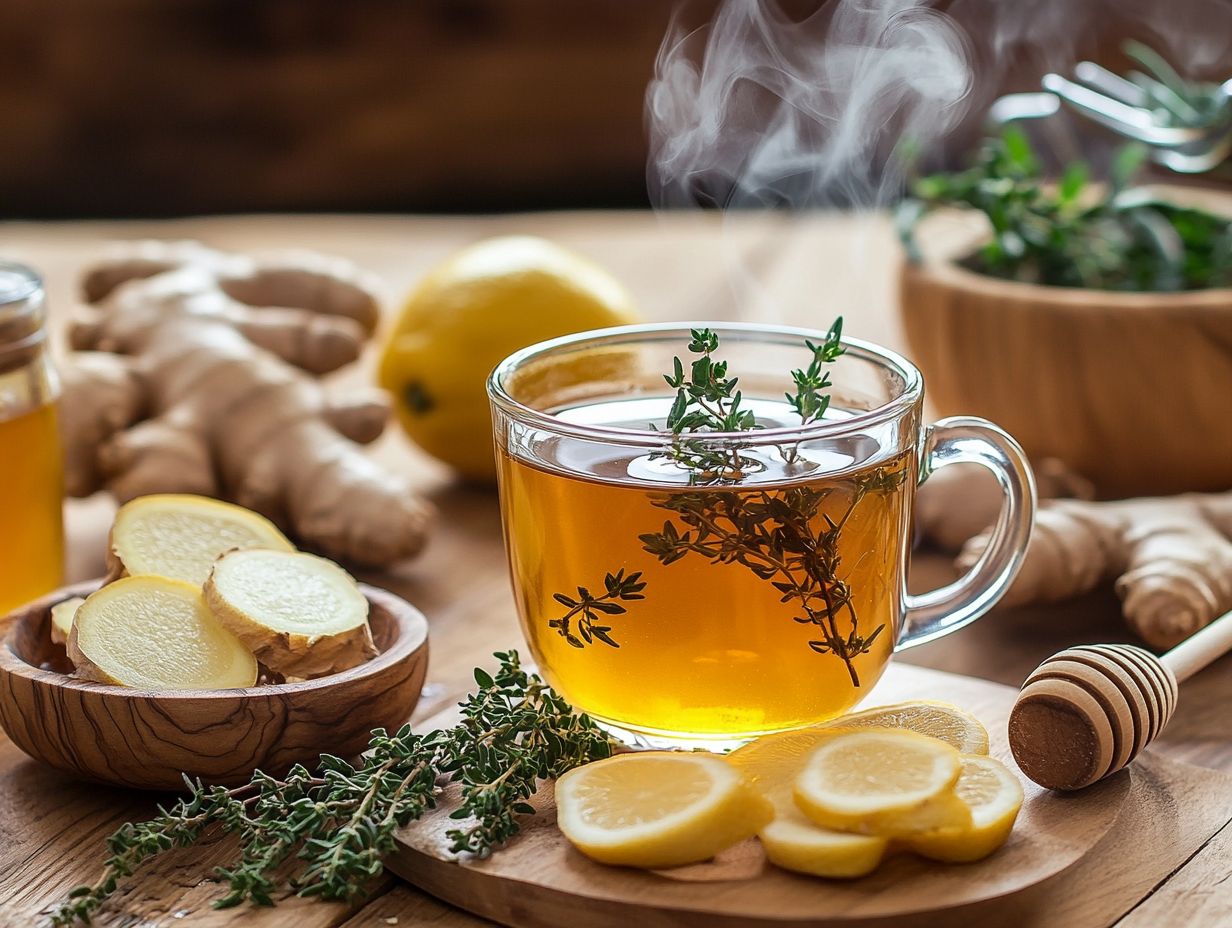
Ready to boost your health? Consulting a healthcare professional is essential for ensuring herbal remedies suit your health needs. They guide you toward effective treatments that won t conflict with medications or conditions.
If you have autoimmune disorders or are undergoing treatment, insights from a healthcare provider are invaluable. They can help you understand how herbal ingredients affect your immune system and avoid harmful reactions.
Seeking professional advice makes managing your health safer. It maximizes the benefits of natural remedies.
Potential Interactions with Medications
Understanding how herbal remedies interact with your medications is crucial for your wellbeing don’t take any chances! Before starting any treatment, grasp how these dynamics can influence your health. Certain herbal ingredients may enhance or inhibit the effects of prescription drugs, leading to unintended consequences.
Take St. John’s Wort, for example it s known to interfere with antidepressants and birth control pills, potentially reducing their effectiveness. Similarly, ginkgo biloba can increase the risk of bleeding if taken alongside blood-thinning medications like warfarin.
These examples highlight the importance of thorough research and seeking professional advice before adding herbal remedies to your regimen. Everyone s health profile is unique, and personalized guidance can help mitigate adverse outcomes.
How to Incorporate Herbal Remedies into Your Daily Routine
Incorporating herbal remedies into your daily routine can significantly enhance your overall health. It strengthens your body’s defenses, offering a proactive approach to wellness while preventing future colds and coughs.
Simple practices like sipping ginger tea, utilizing steam inhalation, and indulging in honey can lead to improved health outcomes. Additionally, you can explore DIY herbal remedies for common cold relief. Maintaining a balanced diet rich in vitamin C and ensuring proper hydration will beautifully complement the effects of these natural treatments.
Tips for Maintaining a Healthy Immune System
Maintaining a robust immune system is vital for warding off colds and flu. Incorporating specific practices can significantly bolster your defenses. Regular hydration, a balanced diet overflowing with vitamin C, and probiotics can optimize your immune function.
Don’t overlook herbal remedies like ginger and garlic they can further enhance your body’s natural infection-fighting abilities. Focus on whole foods think vibrant fruits, colorful vegetables, wholesome grains, and lean proteins to ensure your body receives essential nutrients that fortify your immunity.
Staying well-hydrated is crucial; water acts as a natural detoxifier, flushing out toxins and supporting your bodily functions. Herbal allies like echinacea and elderberry have long been celebrated for their immune-boosting properties.
Keeping your stress levels in check with practices such as yoga or meditation can surprisingly enhance your immune response. This holistic approach is essential for nurturing your overall well-being.
Frequently Asked Questions
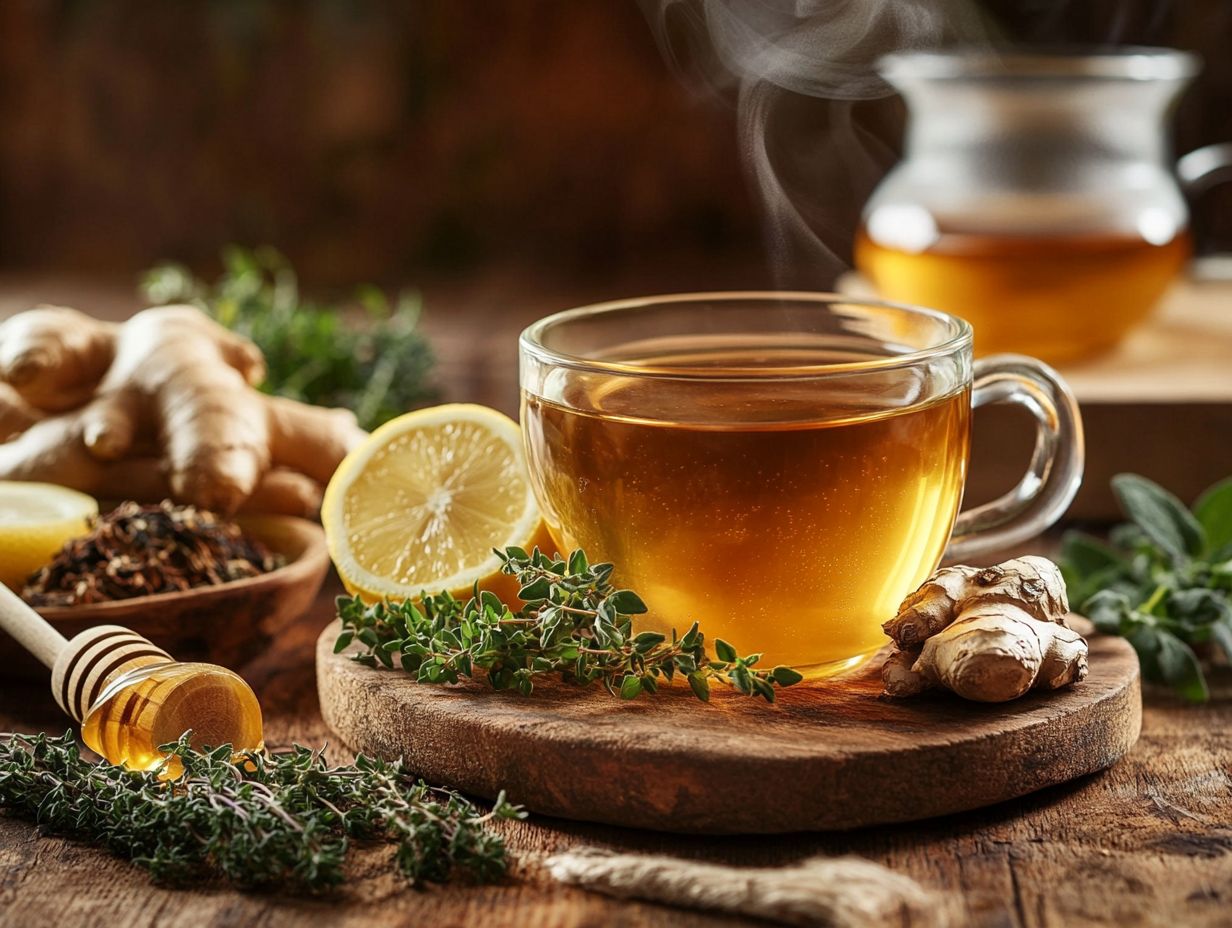
What are some commonly used herbal remedies for cold and cough?
Some commonly used herbal remedies for cold and cough include ginger, garlic, honey, elderberry, and echinacea.
How does ginger help with cold and cough?
Ginger can reduce swelling and fight off viruses. It soothes sore throats, cuts down on coughing, and clears congestion.
Can garlic be used as a natural remedy for cold and cough?
Yes! Garlic fights germs and boosts your immune system, making it a potent remedy for colds and coughs.
Is honey safe to use for cold and cough?
Absolutely! Honey is a natural cough suppressant with antibacterial properties, making it a safe choice for relief.
What is elderberry and how does it help with cold and cough?
Elderberry is a powerful plant that’s been a go-to for fighting colds for generations! It has antiviral and anti-inflammatory properties.
Can Echinacea help to prevent and treat cold and cough?
Echinacea boosts your immune system and helps lessen the severity and duration of cold symptoms. It’s a must-try remedy!

